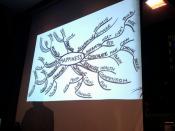"Man does not strive after happiness;
only the Englishman does."
F. Nietzsche, "The Twilight of the Idols".
Since its foundation by J. Bentham in the late 18th century and its further development by J.S. Mill, H. Sidgwick and several other philosophers, utilitarianism has been one of the most controversial moral theories.
The theory's underlying idea is, that only such acts are right which produce and maximise happiness as their outcome, in other words, "... utility, or the Greatest Happiness Principle, holds that actions are right in proportion as the tend to promote happiness, wrong as they tend to produce the reverse of happiness".(1)
Indeed, this principle seems to offer a simple and convenient way of how to act morally right. However, it gave rise to a number of objections brought forward by many philosophers, and, as I am now trying to show, I do not believe utilitarianism can meet them sufficiently.
According to Bentham, the rightness of an action can be determined by simply measuring the amount of happiness it will produce. The more it produces, the better it is. This attracted, and still attracts, a lot of people for "all moral obscurity becomes a matter of technical limitations".(2)
But, critics have argued, using this method of adding and comparing might make us to crude and primitive individuals, seeking only for easy attainable pleasures such as eating, drinking, and sex, which surely produce happiness. But how poor a life consisting only of that.
T.L.S. Sprigge invented an example showing us to what unfavourable decision such a strictly quantitative method can lead. A Benthamite dictator has to decide whether to spend a huge amount of money on preventing a catastrophe destroying the world or on sending an immortal slug-like creature, able to experience low-level happiness, into space. Even if the...


